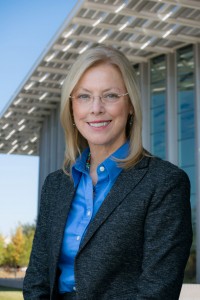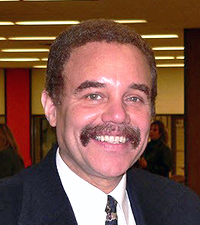
Contact: Carmen Ramos Chandler
Director of Media Relations, California State University, Northridge
(818) 677-2130
carmen.chandler@csun.edu
CSUN & NUA Receive NCAA Grant to Empower Underperforming Students
(NORTHRIDGE, Calif., July 29, 2015) — California State University, Northridge has received a $100,000 grant from the NCAA that supports a partnership between CSUN and the National Urban Alliance for Effective Education (NUA) that encourages and challenges the talents of underperforming students.
The NCAA grant, which includes a requirement that the university contribute an additional $20,000, targets CSUN’s student-athletes, but CSUN and NUA officials said they hope the effort will serve as a model for similar programs across the campus.
“Being an urban, minority-serving institution with one of the highest number of Pell Grant recipients in the country, many CSUN students have not had access to the types of support systems that all students need to succeed,” CSUN President Dianne F. Harrison said. “This generous grant from the NCAA supports a vital partnership between CSUN and the National Urban Alliance, which will go a long way toward providing that support — benefiting our student-athletes, and hopefully our non-student-athletes as well.”
The goal is to provide first- and second-year student-athletes with the tools and support needed to engender confidence, fearless expectations and high intellectual performance — skills that have real-world applications in academic success, career choices and life-long learning. The project will be using NUA’s Pedagogy of Confidence as a model.
The Pedagogy of Confidence was developed by NUA CEO Yvette Jackson. It encourages educators to focus on students’ strengths to inspire learning and success academically. NUA’s mission is to substantiate an irrefutable belief in the capacity of all students to achieve high intellectual performances. Its focus is raising faculty and administrator capacity through professional development that incorporates proven research from cognitive neuroscience on learning, teaching and leading.
“We are excited to be partnering with CSUN and the NCAA to bring the Pedagogy of Confidence to the world of higher education,” said Eric J. Cooper, NUA’s founder and president. “This approach is based on the belief that all of us can step outside of the labels we’re given and reach our full potential. The ideas are bringing about results in public schools all over the country, and it is only natural and appropriate that we apply them at the collegiate level — the springboard for many youth into the ‘real world’ of careers and possibilities.”
Brandon Martin, CSUN’s director of intercollegiate athletics, said he and his staff were looking forward to the partnership.
“Our coaches and staff work incredibly hard to prepare CSUN’s diverse group of student-athletes for success both on and off the field, and this grant from the NCAA and the National Urban Alliance will allow us to make a unique impact on our student-athletes,” Martin said. “Our goal is to grow leaders on the field, as well as in life, and we’re excited to implement this new leadership training that will help both current and future Matadors.”
To support the effort, CSUN will create a series of professional development workshops to train advising, mentoring and tutoring staff and selected faculty in Pedagogy of Confidence principles. The university also will create an online space where staff and faculty can collaborate with one another and NUA staff.
Many of CSUN’s students come from financially challenged backgrounds, and a number are the first in their families to attend college. These circumstances are disproportionately correlated with college underachievement. While CSUN’s retention and graduation rates are on the rise, university officials said they believe additional improvements are possible with the new project.
“Connecting lower-division CSUN students with cultural and academic expectations through mediated learning experiences both inside and outside of the classroom will allow them to thrive,” said Elizabeth Adams, CSUN’s associate vice president for undergraduate studies.
Students who come from traditionally underserved backgrounds come to college with a lack of exposure to many critical features that predict academic success. Among these success markers are: guidance and support for goal setting and achievement; exposure to esoteric academic concepts and language; exposure to discourse that connects them to more expansive concepts and applications across disciplines and global realities; and explicit training in cognitive, research and study skills.
“When students from less-advantaged environments are placed into learning programs with their more advantaged peers, they often feel that they are continually being judged as less capable — rather than feeling pushed to excel,” Adams said. “Potential resulting fears of incompetence and lack of confidence evoke the neurobiological response to stress that can inhibit a student’s comprehension and ability to think on his or her feet — abilities critical to higher-order thinking and professional performance.”
Adams said that by working closely with colleagues at NUA, CSUN officials can break through those fears and provide all students, not just student-athletes, with the tools they need to succeed in college and in their future careers.
The NUA model has been successful in urban school systems nationwide by putting into practice the belief that all students can and are entitled to succeed academically, regardless of cultural, economic and ethnic roots. The organization provides student-focused professional development, advocacy and organizational guidance to accelerate student achievement.
“That power to accelerate student achievement is especially vital when students are underperforming on college or university campuses,” Cooper said. “CSUN is doing a remarkable job retaining and graduating students, including its student-athletes. But by applying Pedagogy of Confidence principles, together we might see even more students go on to succeed.”
Serving more than 40,000 students each year, CSUN is one of the largest universities in the United States, and it has an impact to match its size. CSUN’s 171 academic programs and engaged centers enjoy international recognition for excellence. CSUN currently partners with more than 100 institutions of higher education in 22 countries around the globe and attracts the largest international student population of any U.S. master’s level institution. Situated on a 356-acre park-like setting in the heart of Los Angeles’ San Fernando Valley, the campus features modern educational buildings and world-class LEED Gold-certified performing arts and recreational facilities recognized as among the best in the country. CSUN is a welcoming university that champions accessibility, academic excellence and student success.


